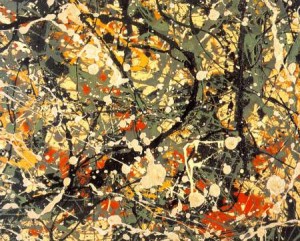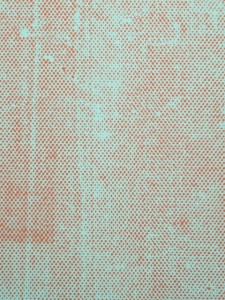I’ve always had trouble making abstract art. I admire the ability, but it’s difficult for me to overcome the delight I feel when I capture a likeness or represent what I see. For me, abstraction isn’t easier than representation (the “my kid coulda done that” school of thought), it’s harder.
I love creating the illusion of space and depth on a two-dimensional plane. Some abstract artists embrace the same challenge, and some work hard to avoid making any allusions to the natural world.
In my second-year seminar class last week we read articles about Alfred Stieglitz, the ground-breaking New York Armory Show of 1913, and several of the artists working then. Not all artists are good writers (of course, not all writers are good painters), but Stuart Davis, a painter from that period explained abstraction in a way that makes the most sense to me.
In his article, “Autobiography” (included in Diane Kelder’s collection Stuart Davis – Praeger Press, 1971), Davis discussed why he hated when viewers asked what his paintings were “about”.
“There is no simple answer to these pesky questions because in reality they are not questions about art at all. They are in fact demands that what the artist feels and explicitly expresses in his work be translated into ideas that omit the very quality of emotion that is the sole reason for its being.”
He goes on, “In the first place let me say that the purpose of so-called “abstract” art is basically the same as all other art, and that it always has a subject matter. In fact the difference between ‘abstract’ and ‘realistic’ art is precisely one of subject matter. It would be more accurate to say that it is a difference of aspects of the same subject matter. The ‘abstract’ artist lives in the same world as everybody else and the subject matter available to him is the same.”
“…But the development of ‘abstract’ art has not been merely a matter of temperaments. It is the reflection in art of that attitude of mind manifested in scientific materialism by which the world lives today. Through science the whole concept of what reality is has been changed…. why should the artist be questioned for finding new realities in his subject matter?”
Or perhaps in Hamlet’s words,
“There are more things in heaven and earth, Horatio,
Than are dreamt of in your Philosophy.”
My seminar class is taught by the wonderful abstract painter (and writer) Stephen Maine (www.stephenmaine.com). Here he is in an interview with Gorky’s Granddaughter discussing his paintings and his process. If I could paint like he does, I might give up reality, too.
http://www.gorkysgranddaughter.com/2013/09/stephen-maine-august-2013.html



